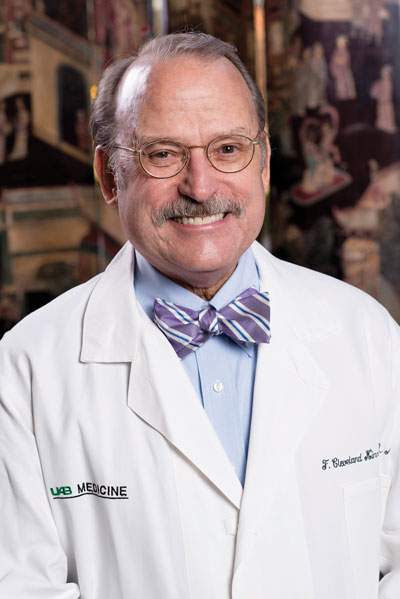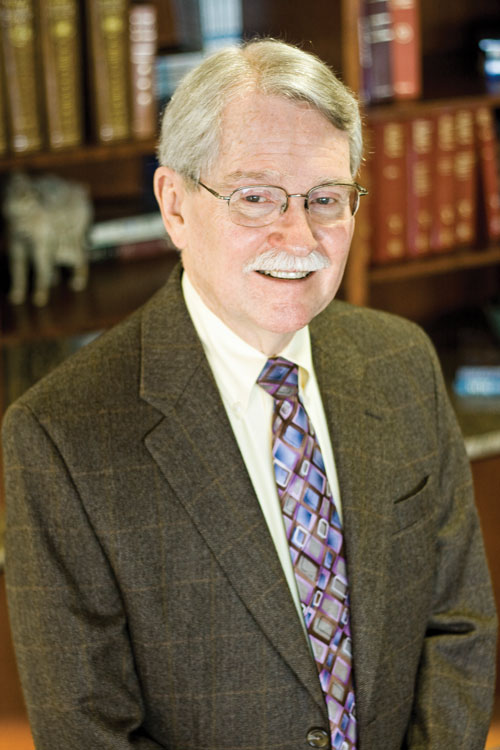Inspired by Excellence
“I went into the field of psychiatry because it’s what I loved,” says F. Cleveland Kinney, M.D., Ph.D., professor emeritus in the UAB Department of Psychiatry and Behavioral Neurobiology. “Medical students should have the opportunity to choose a specialty that brings them joy instead of worrying about the costs associated with graduating.” F. Cleveland Kinney, M.D., Ph.A native of Birmingham, Kinney received his undergraduate degree from Birmingham-Southern College. In 1976, he completed his Ph.D. in anatomy with an emphasis in neuroanatomy, and in 1985 he earned his medical degree from the School of Medicine, followed by a general psychiatry residency and a geriatric psychiatry fellowship in 1989. “Birmingham is my home, and for the past 42 years the School of Medicine has been my emotional and intellectual home,” he says.
F. Cleveland Kinney, M.D., Ph.A native of Birmingham, Kinney received his undergraduate degree from Birmingham-Southern College. In 1976, he completed his Ph.D. in anatomy with an emphasis in neuroanatomy, and in 1985 he earned his medical degree from the School of Medicine, followed by a general psychiatry residency and a geriatric psychiatry fellowship in 1989. “Birmingham is my home, and for the past 42 years the School of Medicine has been my emotional and intellectual home,” he says. Kinney looked to his own early career for inspiration for his personal philanthropic endeavors. “During my residency, the director of psychiatric nursing, Christine L. White, had a significant influence on who I would become as a physician,” he says. To honor her impact, Kinney established the Christine L. White Scholarship to benefit a student interested in psychiatry. “She was gifted in helping trainees distinguish between the psychiatric manifestations of medical illnesses and the symptoms of serious psychotic disorders,” Kinney says. “She was my role model and there is no greater reward for me than to see her achievements honored.” Kinney also serves as president of the Jefferson County Medical Society, and was the founding supporter of the Jefferson County Medical Society Medical School Scholarship Fund.
Long-Term Commitment
Pink L. Folmar Jr., M.D., FACP, chose to dedicate his career to primary care, in part because of the variety and opportunities for long-term relationships that it offers. “When I was in medical school and beginning to think about a specialty, I didn’t want to limit myself to just one organ system, so I chose primary care,” he says. “As a primary care physician, I am not only treating a disease but the whole person. I get to know patients and their families over long periods of time and have the chance to build relationships with them.” Pink L. Folmar Jr., M.D., FACP Folmar grew up in Montgomery, Ala., and completed his undergraduate degree at Vanderbilt University in Nashville, Tenn. He met his wife, Miriam, on his first day of graduate school at The University of Alabama. He was accepted to medical school during his first year of graduate school and started at the School of Medicine the following fall. Folmar graduated from the School of Medicine in 1972, and in 1976 he completed his residency in internal medicine while serving as chief resident.
Pink L. Folmar Jr., M.D., FACP Folmar grew up in Montgomery, Ala., and completed his undergraduate degree at Vanderbilt University in Nashville, Tenn. He met his wife, Miriam, on his first day of graduate school at The University of Alabama. He was accepted to medical school during his first year of graduate school and started at the School of Medicine the following fall. Folmar graduated from the School of Medicine in 1972, and in 1976 he completed his residency in internal medicine while serving as chief resident. After completing his residency, Folmar became an internist with Simon-Williamson Clinic in Birmingham, where he remained for 29 years. In 2005, he and his wife moved to the rural town of Brundidge, Ala., (population 2,500), where his wife owns a pine tree farm. Folmar managed the town’s only medical practice, caring for a rural patient population in an agricultural area, a significant departure from what he was accustomed to in Birmingham
“When a primary care physician practices in a community that has limited access to medical care, the physician will always find a significant population with undiscovered diseases,” Folmar says. “It’s challenging yet rewarding because I knew my contribution impacted the community.” Folmar and his wife moved back to Birmingham in 2010 and he currently practices at MedHelp as a general internist. Folmar will assume the role of president of the University of Alabama Medical Alumni Association in March 2015.
Folmar is a consistent and generous supporter of medical student scholarships. “I know that the burden on young physicians to repay medical school debt can be overwhelming,” he says. “That’s why it’s so important for me to contribute to training the next generation of physicians—I want to give the same opportunities that I had to other young physicians, especially those who aim to practice primary care.”